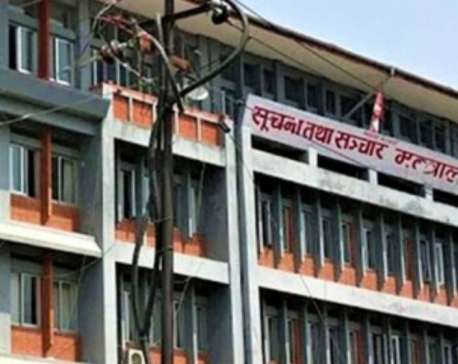
OR
Interview
First Five Years of Federal Experience
Published On: April 26, 2022 09:05 PM NPT By: Republica | @RepublicaNepal
_20220426210826.jpg)
'We should learn from the stories of failure and replicate the stories of success'
Dr Bishwo Nath Poudel
Vice-Chairman, National Planning Commission
Dr Biswo Nath Poudel is the Vice Chairman of the National Planning Commission (NPC), an advisory body for formulating development plans and policies of the government. Dr Poudel holds a PhD in Agricultural and Resource Economics from the University of California, Berkeley. As a renowned economist closely following the economic development of Nepal, Dr Poudel has in-depth understanding of Nepal's development process, including the challenges and opportunities. As it has been almost five years since Nepal embraced the federal system of governance to decentralize decision-making process at the local level and expedite the pace of the country's sluggish development, Republica's Dilip Poudel talked to Dr Poudel to learn about various issues pertaining to development, including the current pace of development, and the challenges and opportunities that Nepal came across during its first five years of experience with federalism. Excerpts:
While implementing the new federal constitution, we envisioned sub-national governments to play significant roles in the country’s economic development. How effective have these governments been in terms of expediting the country’s development process?
The provinces and the local governments have their own grievances. The provinces say they are not provided with the technical manpower and the civil servants who are sent to the provinces and local governments, too, have a feeling that they were penalized by the federal government. Relevant laws were not formulated and enforced on time. In a number of local governments, there is only one engineer and only 2/3 under-secretary level staff are available while there is a need for 40 to 45 such high level officials. They complain that they were handed over the projects without providing adequate budget and human resources.
The local bodies also complain that they are not treated fairly by the central government. They complain that the central government only provided them excess liability but not adequate budget and manpower. For example, they are asked to construct health posts but without giving them the land plots! The sub-national authorities share their grievances that they have failed to ensure effective delivery because of these adversities. Despite these odds and a few stories of failure, we have achieved the set targets to some extent. The implementation part of the federal norms has been growing stronger. We have to learn lessons from the stories of failure and replicate the stories of successes.
The central government has been disbursing a budget of around Rs 450-500 billion annually at the local level. Do you think this money is being utilized properly for development purposes?
There is no monitoring and evaluation conducted on this matter so far. So, it is difficult to say with certainty the effectiveness of the spending of this budget. Earlier, the District Coordination Committees were supposed to work in this regard. In some regions, we don’t have complete statistics of the work done. In a number of cases, there are complaints of corruption in the early days. In other cases where development works were done through consumer committees and cooperatives, there appears a shortfall to achieve the targeted goals. Limited development works, mostly on road construction, are found to have made satisfactory progress. Though a large number of road construction works have been carried out, the quality of these works has been questioned. If we look at health and education, we don’t have any grounds to claim that the quality of education and health has progressed.
This may be because of the allocation of more budgets at the local level. It is seen that individuals rush to be elected as people’s representatives or to be a member of the local consumer committee. Has this tendency brought about foul practices including corruption and misappropriation of budget at the local level?
If there is no mechanism in place to ensure check and balance when it comes to power play and resource utilization, it creates different types of problems. It is only recently that the authorities concerned seem to have started playing their roles.
Does this mean that the people’s representatives have been considering power play at the local level as political essence rather than social issues?
In a few cases, some elected representatives are found taking undue benefits out of the situation. However, a large number of others love their areas and have spent their whole life solving the issues at the local level. They are also experienced and have gone through situations in the past when even basic amenities like drinking water were not available to them. They have been assuming their social responsibilities as well. As people start practicing their collective wisdom through the periodic elections, such types of problems will be overcome over time.
Despite the implementation of a federal system, a large number of projects are held by the central government. Why are we not able to practice delegating authorities of such projects to the local and provincial governments? Where did we miss our course?
The federal government should have sent necessary human resources to the grassroots level when the federal system was implemented. Until and unless efficient bureaucrats are sent to the local governments, the one who are assuming their positions at Singh Durbar will keep on grabbing big projects. This will provide fruitful results if we are able to synchronize projects by making skilled human resources available at the local level. This kind of weakness was largely seen in the initial stage. Now, Singh Durbar has realized that there is a need to ensure synchronization among resources, responsibility and manpower and bring necessary corrections.
The government is currently busy drafting the annual budget for the new fiscal year. What types of projects the NPC is giving the highest priority to in the new budget?
Of course, the programs defined by the ongoing periodic plan have been kept in the priority list. NPC has been giving more priority to women empowerment-based projects including drinking water facilities, embankment of rivers (currently the issue has been given less priority, but it is closely connected to the vulnerable groups) and women-focused residential hostels (as many women face sexual assaults while on their way to school). In addition, road construction, electricity supply to the deprived community, drinking water related projects and big infrastructure projects like the widening of the East-west Highway, fast-track construction and expansion of roads that connect major cities will be given high priority. Likewise, the connectivity to remote locations like Dunai of Dolpa and Chame of Manang will also be kept in priority. The government will allocate adequate funds for these projects.
Has any game changer project been planned as well for the next fiscal year?
The importance of the widening of major road networks including the East-west Highway, Nijgadh-Kathmandu Fast Track and Kathmandu-Pokhara Highway should not be undermined while talking about new projects. In fact, these projects also need a large amount of money and the government is committed to provide adequate funds on time. We have also targeted to upgrade terminals of major airports including those in the Terai region. The government will launch a ‘One house, one tap’ program in order to ensure smooth distribution of drinking water. These are our game changer plans for the next year.
We must admit the fact that we have failed to attract foreign direct investment in mega infrastructure projects. What do you think are the reasons behind this problem?
It is clearly seen that there always appears to be protests against any sort of foreign grant and foreign investment projects. Mainly the contractors who do not get the projects make a lot of hue and cry using different platforms. Successive protests spread a bad message about the country in the international forum, which creates problems in attracting foreign direct investment. In almost every project like Nagdhunga tunnel road and Melamchi Drinking Water Supply, contractors have complained of facing various protests.
You May Like This

MoCIT holds discussion on preliminary draft of 16th five-year periodic plan
KATHMANDU, Aug 23: The Ministry of Communications and Information Technology (MoCIT) held discussion with its subordinate agencies on the preliminary... Read More...

Five things to keep in mind before going into the interviews
Are you about to head to an interview? Are you nervous, unprepared? Is this your first time and you're panicking... Read More...

Irrigation facility to be available on additional 44,000 hectares in next three years
KATHMANDU, Oct 26: The government has brought a strategy of providing irrigation facility on additional 44,500 hectares area in the... Read More...







Just In
- NRB to provide collateral-free loans to foreign employment seekers
- NEB to publish Grade 12 results next week
- Body handover begins; Relatives remain dissatisfied with insurance, compensation amount
- NC defers its plan to join Koshi govt
- NRB to review microfinance loan interest rate
- 134 dead in floods and landslides since onset of monsoon this year
- Mahakali Irrigation Project sees only 22 percent physical progress in 18 years
- Singapore now holds world's most powerful passport; Nepal stays at 98th











Leave A Comment